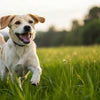Should Dogs with Kennel Cough Exercise? Understanding the Best Approach for Your Pet
- Houndsy
Table of Contents
- Introduction
- Understanding Kennel Cough
- Should Dogs with Kennel Cough Exercise?
- Caring for Your Dog with Kennel Cough
- Preventing Kennel Cough
- Conclusion
- FAQ
Introduction
As devoted dog owners, we often find ourselves asking: how can we ensure our furry friends stay healthy and happy, especially when they fall ill? With kennel cough being one of the most common respiratory ailments in dogs, this question becomes even more pertinent. Did you know that kennel cough, officially known as Canine Infectious Respiratory Disease Complex (CIRDC), can affect any dog, regardless of age or breed? It spreads quickly in environments where dogs congregate, such as parks, kennels, and doggy daycares.
In this post, we will explore whether dogs with kennel cough should exercise and what that means for their health and recovery. By the end of this article, you will understand the implications of exercise during this illness, how to care for your dog, and when to consult a veterinarian. We will also touch on the significance of proper nutrition and hydration during the recovery process, emphasizing how our Houndsy Kibble Dispenser can make feeding easier.
Understanding Kennel Cough
What is Kennel Cough?
Kennel cough is an upper respiratory infection caused by a variety of viral and bacterial agents, with Bordetella bronchiseptica being the most notorious. This condition is characterized by a persistent, dry cough that can sound alarming but is often mild. Understanding kennel cough is crucial for any dog owner. It’s not just about the cough; it’s about recognizing the signs, providing care, and ensuring a speedy recovery.
Symptoms of Kennel Cough
Common symptoms of kennel cough include:
- A dry, hacking cough
- Sneezing
- Nasal discharge
- Lethargy
- Reduced appetite
In severe cases, dogs may exhibit signs of fever or experience difficulty breathing. It’s essential to monitor your dog closely and consult a veterinarian if symptoms worsen or persist.
How is Kennel Cough Transmitted?
Kennel cough is highly contagious and can spread through:
- Airborne droplets released when an infected dog coughs or sneezes
- Direct contact with infected dogs
- Contaminated surfaces, such as food bowls or toys
Due to its infectious nature, keeping an infected dog away from other pets is critical until they recover.
Should Dogs with Kennel Cough Exercise?
The Impact of Exercise on Recovery
When it comes to exercise for dogs with kennel cough, the general consensus among veterinarians is clear: exercise should be limited or avoided altogether during the initial stages of illness. Engaging in physical activity can exacerbate coughing and respiratory distress, leading to a longer recovery time.
Why is Exercise Not Advised?
- Increased Respiratory Strain: Exercise can put additional stress on an already compromised respiratory system, causing further irritation and inflammation.
- Risk of Secondary Infections: A dog’s immune system is already working hard to fight off the infection. Adding physical exertion can increase the risk of developing secondary infections like pneumonia.
- Contagion Risk: If your dog is coughing, taking them to public spaces or dog parks exposes other dogs to the infection, perpetuating the cycle of kennel cough.
Gentle Alternatives to Exercise
While traditional exercise should be avoided, it’s still crucial to ensure your dog gets some level of activity to maintain their mental and emotional well-being. Here are some gentle alternatives:
- Short, Calm Walks: If your veterinarian approves, short walks in a quiet area can provide mental stimulation without overexerting your dog. However, these should be strictly limited to bathroom breaks.
- Playtime Indoors: Engage your dog in low-energy play activities at home. Use soft toys for gentle fetch games or encourage them to solve treat puzzles.
- Mental Stimulation: Consider interactive toys that challenge your dog’s mind without requiring physical exertion. This can include treat-dispensing toys, which can be easily filled using our Houndsy Kibble Dispenser.
Caring for Your Dog with Kennel Cough
Importance of Rest and Nutrition
During recovery from kennel cough, rest is paramount. An environment that promotes relaxation can significantly aid your dog’s healing process. Here are several key elements to consider:
- Hydration: Ensure your dog has constant access to fresh water. Hydration is crucial for recovery and helps thin mucus in the respiratory tract.
- Nutrition: A balanced diet supports your dog’s immune system. The Houndsy Kibble Dispenser makes it easy to provide consistent, perfectly portioned meals, ensuring your dog receives high-quality nutrition during their recovery.
Monitoring Recovery Progress
Keep a close eye on your dog’s symptoms. If you notice any signs of worsening conditions—such as excessive coughing, difficulty breathing, or loss of appetite—contact your veterinarian promptly.
When to Seek Veterinary Care
It is essential to consult a veterinarian if:
- Your dog shows signs of lethargy or refusal to eat for more than 24 hours.
- The coughing worsens or is accompanied by nasal discharge or fever.
- There are any signs of difficulty breathing.
Veterinarians may recommend supportive care, which could include medication, humidified air, or additional treatments tailored to your dog’s specific needs.
Preventing Kennel Cough
Vaccination
Preventing kennel cough is far more effective than treating it. Vaccination against Bordetella bronchiseptica is highly recommended, especially for dogs frequently exposed to other dogs. Speak with your veterinarian about incorporating the kennel cough vaccine into your dog’s healthcare routine.
Limiting Exposure
To reduce the risk of your dog contracting kennel cough in the future, consider the following:
- Avoid crowded dog areas: Limit visits to parks or events where many dogs gather.
- Regular health checks: Ensure your dog is healthy and up-to-date on vaccinations before engaging in social activities.
- Hygiene practices: Maintain good hygiene with your dog’s belongings, such as bowls and toys, to minimize the risk of transmission.
Conclusion
Kennel cough, while often mild, can lead to complications if not properly managed. For dogs experiencing this illness, exercise should be minimal to avoid exacerbating their symptoms. Instead, focus on providing a nurturing environment that encourages rest and recovery while ensuring proper nutrition.
As we strive to care for our furry companions, let’s not forget the importance of quality feeding practices. Our Houndsy Kibble Dispenser can play a significant role in maintaining your dog’s health, ensuring they receive the right portions of nutritious food with ease.
Reflective Questions
- How can you create a comfortable, quiet space for your dog while they recover?
- What steps can you take to prevent kennel cough in your home?
- Have you considered how your dog’s feeding routine can be improved during illness?
FAQ
Can dogs with kennel cough exercise?
No, it is generally advised to limit exercise for dogs with kennel cough to prevent worsening their symptoms and further strain on their respiratory system.
How long does kennel cough last?
Most cases of kennel cough resolve within 1-3 weeks, but the duration can vary depending on the severity of the infection and the overall health of the dog.
When should I take my dog to the vet for kennel cough?
You should consult a veterinarian if your dog shows significant lethargy, refuses to eat, or has a persistent cough that worsens over time.
Can kennel cough be prevented?
Yes, kennel cough can be prevented through vaccination and by limiting your dog's exposure to crowded areas where other dogs congregate.
What is the best way to care for a dog with kennel cough?
Provide plenty of rest, ensure they stay hydrated, and maintain a nutritious diet. Consider using our Houndsy Kibble Dispenser for convenient feeding.
By prioritizing our dogs’ health and well-being, we can support their recovery from kennel cough and ensure they live happy, fulfilling lives.












